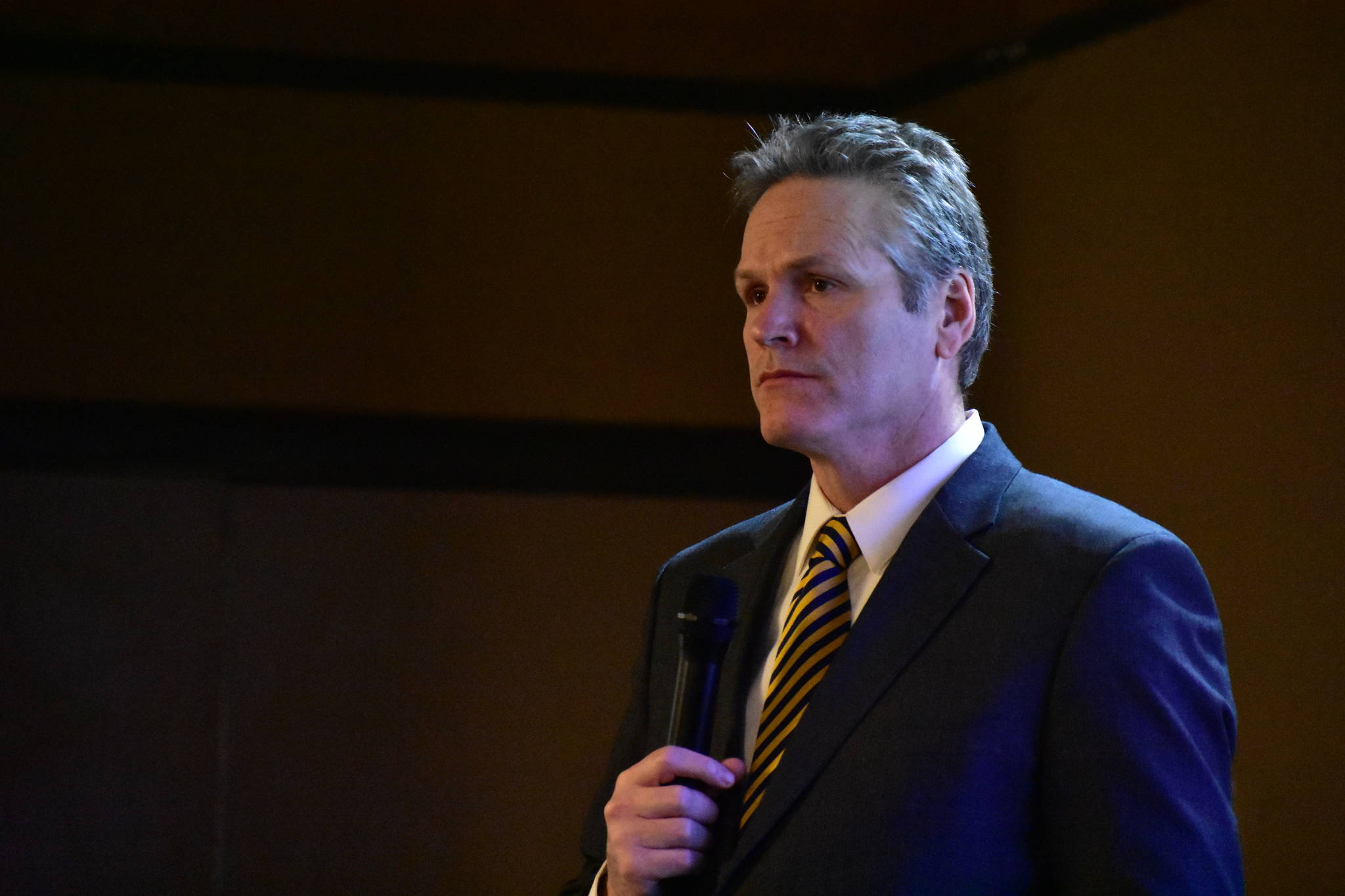Gov. Mike Dunleavy articulated his vision of an Alaska flourishing on the back of a thriving and responsible resource development industry to the Alaska Municipal League Thursday morning.
“There was a time in this state and in this country where you could find jobs, family wage jobs,” Dunleavy told municipal leaders from around the state gathered at the Baranof Hotel for the League’s legislative conference.
“We have a situation in this country now that says we cannot develop things, that we should not develop things.,” he said. “Every time we talk about some type of infrastructure project, there’s pushback.”
He compared Iceland to Venezuela, a reference he made before to the Alaska State Chamber of Commerce last month. Iceland, he said, has politics “that work.” That country doesn’t have a lot of natural resources, Dunleavy said, but they make decisions that allows the country’s economy to flourish.
The governor did not elaborate on exactly what in Iceland’s economy he admires, but the country has substantial foreign investment in hydro and geothermal power and aluminum processing, according to Forbes.
Venezuela on the other hand, “is falling apart,” because of their politics, he said. Venezuela has been in a political and economic crisis for years, much of which is blamed on the leadership of former president Hugo Chavez, according to the BBC.
Alaska is at a crossroads, according to the governor, and has a choice between the examples of Iceland and Venezuela.
Many in the audience were receptive to the governor’s message and said they shared his vision of Alaska. But there was an array of concerns about how the state was being run, both by the Legislature and the administration.
“We are having hard times with local police,” said Elmer Armstrong Jr., a member of the Northwest Arctic Borough Assembly. “They’re not paid enough, they don’t have as many hours. In last year’s budget you cut $3 million from the (Village Public Safety Officer) program.”
Norvik said that when there’s an issue requiring a response from Alaska State Troopers, the community has to wait for the troopers to charter a plane, which can often be delayed because of weather.
Kodiak Mayor Patricia Branson asked if the governor had a four-point plan to address the state’s issues. Sens. Natasha Von Imhof, R-Anchorage, and Peter Micciche, R-Soldotna, had articulated such a plan to the Municipal League earlier this week and Branson wanted to know if the governor had something similar she could take back to her constituents.
Dunleavy said last year’s budget cuts “took the air out of the room. There’s no doubt it was a traumatic experience for many in Alaska.”
But he said he was committed to funding public safety, and if there were people willing to fill the VPSO roles, he would fund them. He pointed out the reductions to the program last year were removing the funding from positions that had not been filled.
“If there are people that want to step up and fill those roles, we will fund them,” Dunleavy said.
To Branson, he said one of his goals was to introduce a constitutional spending limit so the state would not find itself in a similar fiscal situation in the future. Dunleavy has said his cuts were necessary to balance the state’s budget which grew substantially after the price of oil dropped in 2015.
“Once that happens, we can have the conversation much quicker,” Dunleavy said about proposals such as introducing additional revenue measures or other long-term projects. “I’m looking at hemming our spending in and then I’m wide open for discussion on how we fill that.”
Dunleavy summed up his speech by saying that everyone in Alaska need to give a little to get a lot.
But, he said, “everyone still wants their full piece of a diminishing pie.”
• Contact reporter Peter Segall at 523-2228 or psegall@juneauempire.com.

